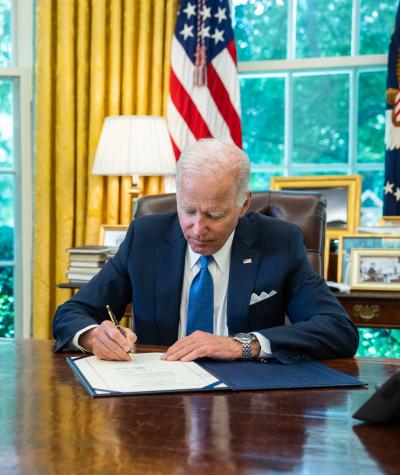Last month, the United States Senate once again failed to advance the Democracy is Strengthened by Casting Light on Spending in Elections (DISCLOSE) Act, vital legislation that would mandate transparency from entities spending money on political ads designed to influence our vote and our government. In the face of this continued impasse, the public must now look outside of Congress for solutions to the growing shroud of secret spending in our elections, sometimes called “dark money.”
One option is clear: executive action by President Joe Biden.
Secret spending refers to funds spent to influence elections whose origin is not publicly disclosed. Wealthy special interests, including billionaires and corporations, can raise and spend an unlimited amount on election ads through “dark money” groups, allowing them to rig our political system in their favor while concealing their involvement. Voters have a right to know the source of this spending so they can weigh the credibility of the election ads they see and cast an informed vote.
The “secret” nature of secret spending also often only applies to the public’s knowledge; elected officials who benefit from secret spending frequently know exactly which donors helped them get elected. Dark money thereby enables special interests to buy political access and influence without accountability.
Secret money most frequently enters our political system through undisclosed donations to 501(c)(4) social welfare groups or 501(c)(6) trade associations, which are named after the sections of the Internal Revenue Code that grant each tax exempt status. Unlike charities, these nonprofit corporations are permitted to spend on political activity, as long as that is not their “primary” purpose.
The crucial point is that unlike political committees, these entities are also not required to publicly disclose their funding sources, even as they spend increasing amounts on political ads and funnel money into super PACs that are required to report contributors.
Since 2010, 501(c) nonprofits have spent and contributed more than $2 billion to influence federal elections – the majority of which was financed by undisclosed donors. And the growth of secret spending is only accelerating, with dark money groups spending more than $1 billion to influence the 2020 election alone.
Comprehensive legislation (such as the DISCLOSE Act) extending disclosure requirements to these shadowy groups is the ideal solution to this problem. Unfortunately, obstructionism in Congress prevents such legislation from even being voted on, so the general problem is likely to remain for the foreseeable future. Voters cannot wait for Congress to act.
Instead, President Biden should do what he can to bolster political transparency, including using his power to issue an executive order requiring federal contractors to disclose their political spending.
The federal government spends hundreds of billions of dollars every year in contracts with private companies that provide essential goods and services. These taxpayer-funded contracts are often extremely lucrative, and competition to procure one can be intense.
To prevent both the appearance and reality of a “pay-to-play” system, federal laws have long included a federal contractor contribution ban that prohibits these companies from making contributions to federal candidates or political committees, including “independent” groups like super PACs. This restriction helps ensure that profitable, taxpayer-funded contracts are not for sale to wealthy political donors.
However, the federal contractor contribution ban has not been interpreted to apply to donations to 501(c) organizations, the aforementioned groups flooding our elections with secret spending. As a result, federal contractors can currently exploit a loophole to engage in undisclosed political spending.
A recent report by Public Citizen, which tracked donations to 501(c) organizations from the top fifteen federal contractors by revenue in the S&P 500, revealed that only five of these contractors fully disclose their contributions to dark money groups used for electioneering purposes. The other ten do not disclose or only partially report the details of such political spending.
This data exemplifies how federal contractors are fueling the growth of secret money in elections, while violating the principles behind a longstanding law meant to prevent them from financing efforts to elect the public officials that decide whether to give them taxpayer-funded business.
At a minimum, federal contractors’ political spending should be out in the open, not in secret and concealed from public view.
In remarks supporting passage of the DISCLOSE Act, President Biden said “Ultimately, this comes down to public trust. Dark money erodes public trust. We need to protect public trust. And I’m determined to do that.”
An immediate way to fulfill that promise would be an executive order requiring federal contractors to disclose their political spending. This action would not be a panacea for all the issues created by secret money, but it could at least better provide voters with insight into federal contractors’ election spending.
Moreover, an executive order requiring such transparency would begin shining a light into the larger workings of our campaign finance system. Secret political spending would be significantly reduced, and that is a step worth taking.
Voters need real transparency about who is spending on elections. With a stroke of his pen, President Biden can bring the country closer to that vision and the promise of a democracy that works for us all.

